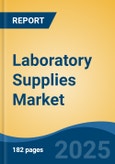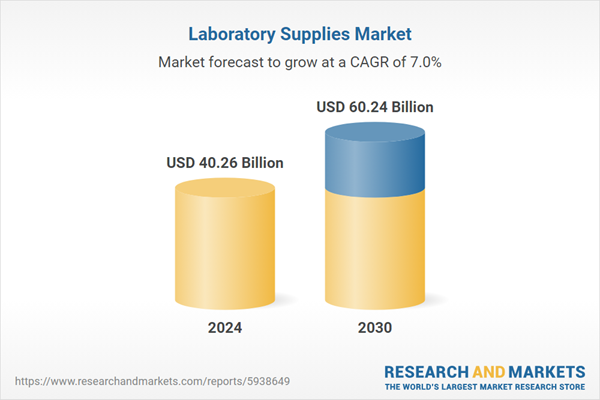Speak directly to the analyst to clarify any post sales queries you may have.
10% Free customizationThis report comes with 10% free customization, enabling you to add data that meets your specific business needs.
Examples of laboratory equipment include microscopes, centrifuges, spectrophotometers, analytical balances, pipettes, incubators, and autoclaves. Consumables are single-use or disposable items used in laboratories for specific tasks. They include items like pipette tips, petri dishes, culture plates, sample vials, syringe filters, and cuvettes. Consumables are often used to avoid contamination and ensure the accuracy of experiments. Industries such as materials science, metallurgy, and chemical manufacturing require laboratory supplies for materials testing, quality assurance, and composition analysis.
The pharmaceutical and biotechnology sectors are continuously evolving, with increasing investments in drug discovery, development, and manufacturing. This sector's growth fuels the demand for laboratory supplies, particularly for quality control and clinical research. The increasing demand for diagnostic tests, including clinical, molecular, and genetic diagnostics, stimulates the laboratory supplies market. Diagnostic laboratories require various supplies to conduct tests for disease diagnosis and monitoring. Growing concerns about environmental pollution, climate change, and water and air quality drive the demand for laboratory supplies used in environmental monitoring and testing, including sensors, spectrometers, and reagents.
Advances in genomics, proteomics, and personalized medicine are pushing the need for specialized laboratory supplies, such as DNA sequencers, PCR instruments, and cell culture media. The adoption of digital technologies and automation in laboratories is driving the need for modern laboratory supplies, including robotic systems, automated liquid handling, and data management tools. A growing emphasis on sustainability is driving the development and adoption of eco-friendly laboratory supplies and equipment.
Key Market Drivers
Pharmaceutical and Biotechnology Advancement
Pharmaceutical and biotechnology companies require state-of-the-art laboratory equipment for drug discovery, development, and quality control. This demand drives the development of advanced laboratory instruments, such as mass spectrometers, high-performance liquid chromatography (HPLC) systems, and next-generation sequencers. To meet the unique needs of pharmaceutical and biotechnology research, specialized reagents and consumables are developed. These include molecular biology reagents, cell culture media, and high-purity chemicals critical for experimentation and production.Automation is increasingly integrated into pharmaceutical and biotechnology laboratories to enhance efficiency and reduce human error. Robotics, liquid handling systems, and automated sample preparation equipment have become essential in high-throughput screening and analysis. Bioprocessing equipment, such as bioreactors and cell culture systems, is crucial for biotechnology companies involved in the production of biopharmaceuticals. The advancement of these systems has a direct impact on laboratory supplies in this sector.
Key Market Challenges
Supply Chain Disruptions
Unforeseen global events, such as the COVID-19 pandemic, can disrupt the supply chain by causing factory closures, transportation delays, and workforce shortages. These disruptions can lead to supply shortages and delays in product delivery. Disruptions in global shipping and transportation networks, including container shortages, port congestion, and changes in shipping routes, can affect the timely delivery of laboratory supplies. This may lead to increased shipping costs and delays. Supply chain disruptions in the sourcing of raw materials, such as plastics, chemicals, and metals, can impact the production of laboratory supplies. Shortages of critical materials can lead to increased costs and delayed production.Factory closures or reduced production capacities, whether due to natural disasters, labor disputes, or other factors, can result in delays in the manufacturing of laboratory supplies. Challenges in warehousing and distribution, including the need for social distancing and safety measures in distribution centers, can impact the efficiency of getting products to end-users. Supply chain disruptions can lead to quality control issues, as companies may rush production or source materials from less reliable suppliers to meet demand, potentially leading to compromised product quality. Supply chain disruptions can result in price volatility for laboratory supplies. Increased demand and reduced supply can lead to price increases, which can impact laboratories' budgets.
Key Market Trends
E-commerce and Digitalization
The rise of e-commerce has led to the emergence of online marketplaces specializing in laboratory supplies. These platforms allow laboratories to browse, compare, and purchase a wide range of supplies, including equipment, reagents, and consumables, with the convenience of online shopping. Many laboratory supply companies have moved from traditional paper catalogs to digital catalogs, which can be easily accessed online. Digital catalogs provide up-to-date product information, pricing, and specifications, making it easier for customers to find what they need. Digital platforms provide transparency in pricing, allowing customers to compare prices and product offerings from different suppliers.This transparency can lead to more competitive pricing and informed purchasing decisions. Digitalization streamlines the procurement process. Laboratories can create digital purchase orders, track orders, and manage their inventory electronically, reducing paperwork and administrative burdens. E-commerce has expanded the reach of laboratory supplies. Laboratories can access products from suppliers worldwide, expanding their options and potentially finding unique or specialized items. E-commerce facilitates various digital payment methods, including credit cards, electronic funds transfer (EFT), and digital wallets, streamlining the payment process.
Key Market Players
- Agilent Technologies, Inc.
- Bio-Rad Laboratories, Inc.
- Bruker Corp.
- Danaher Corp.
- FUJIFILM Holdings Corporation
- PerkinElmer Inc.
- Sartorius AG
- Shimadzu Corporation
- Thermo Fisher Scientific Inc.
- Waters Corporation
Report Scope:
In this report, the Global Laboratory Supplies Market has been segmented into the following categories, in addition to the industry trends which have also been detailed below:Laboratory Supplies Market, By Product:
- Equipment
- Disposables
Laboratory Supplies Market, By region:
- North America
- United States
- Canada
- Mexico
- Asia-Pacific
- China
- India
- South Korea
- Australia
- Japan
- Europe
- Germany
- France
- United Kingdom
- Spain
- Italy
- South America
- Brazil
- Argentina
- Colombia
- Middle East & Africa
- South Africa
- Saudi Arabia
- UAE
Competitive Landscape
Company Profiles: Detailed analysis of the major companies present in the Global Laboratory Supplies Market.Available Customizations:
With the given market data, the publisher offers customizations according to a company's specific needs. The following customization options are available for the report.Company Information
- Detailed analysis and profiling of additional market players (up to five).
This product will be delivered within 1-3 business days.
Table of Contents
Companies Mentioned
- Agilent Technologies, Inc.
- Bio-Rad Laboratories, Inc.
- Bruker Corp.
- Danaher Corp.
- FUJIFILM Holdings Corporation
- PerkinElmer Inc.
- Sartorius AG
- Shimadzu Corporation
- Thermo Fisher Scientific Inc.
- Waters Corporation
Table Information
| Report Attribute | Details |
|---|---|
| No. of Pages | 182 |
| Published | March 2025 |
| Forecast Period | 2024 - 2030 |
| Estimated Market Value ( USD | $ 40.26 Billion |
| Forecasted Market Value ( USD | $ 60.24 Billion |
| Compound Annual Growth Rate | 6.9% |
| Regions Covered | Global |
| No. of Companies Mentioned | 10 |









